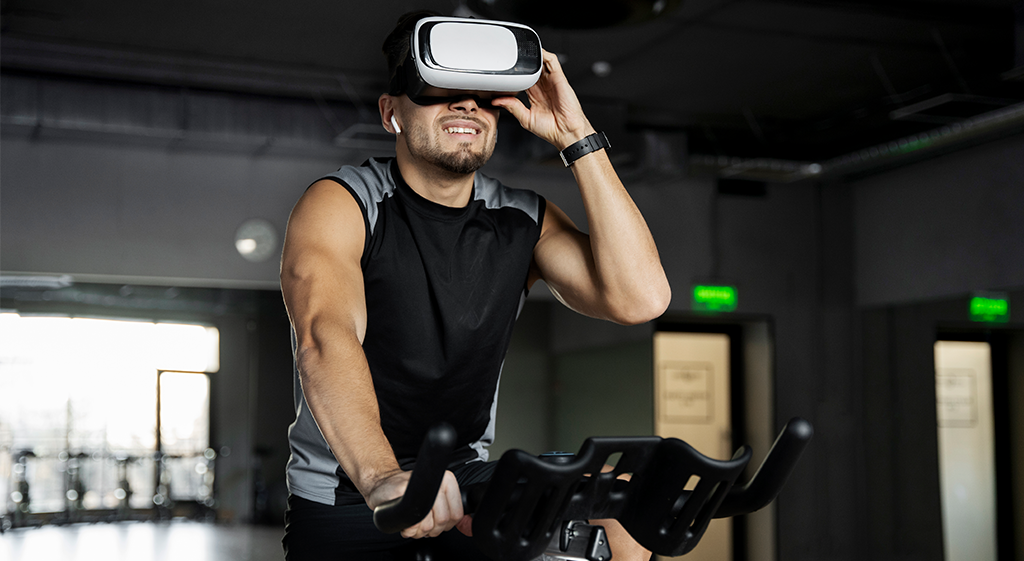Technology and fitness move hand in hand to make working out and physical care more convenient. Various tech-savvy tools and equipment continue to describe fitness trends and amplify the drive toward a healthy lifestyle. When discussing technology and fitness, including Artificial Intelligence (AI) is a must. The fusion of AI with the fitness industry has been an influential advancement that keeps revolutionizing the fitness regime.
Gyms are the hub for fitness geeks seeking a dedicated place to fulfill their fitness passion and meet their needs. Therefore, it is evident that Artificial Intelligence holds immense potential to restructure and transform the industry, simultaneously improving and enhancing the member experience in the future. From personalized training programs to efficient gym management, AI-driven innovations can improve gym operations by adding the unavoidable magic of technology.
Unveiling the future of AI and its impact on the fitness industry
The drastic expansion of Artificial Intelligence and its practical implications will be an evident part of the business world, the fitness industry included. Since the pandemic, people have changed their ways of fitness training and workout routines. The quarantine phase exposed people to many tech-savvy tools, making training relatively convenient.
Today, many apps offer virtual training with figurines imitating all exercises so people can follow along, making workouts easy. The fast-paced growth of AI will change the fitness trends and approach with which people address their fitness needs. We will unveil some AI dimensions that will become hot trends in gym management and the fitness world as a whole.
Personalized training programs

The use of management software systems already ramps up gym development and growth, but with further AI advancements, gym managers and owners can completely restructure their business models for good.
AI technology has the power to collect and analyze data from various sources and even evaluate multiple types of information to provide comprehensive results. For instance, gym owners can use this ability to assess their members’ fitness levels, health records, preferences, and other details to provide tailored and personalized training programs.
By leveraging machine learning algorithms, AI can continually adapt these programs based on individual progress, adjusting exercise intensity, duration, and frequency. For example, if a member’s goal is to lose weight, the AI systems can modify the workout regimen and suggest suitable exercises for weight loss, canceling the need for a trainer. This personalized approach increases member engagement and motivation, improving adherence to workout routines and fitness outcomes.
Virtual personal trainers
Gyms that want their members to have a personalized experience facilitate this with personal trainers and customizable workout options. AI-driven virtual trainers can be integrated into gym equipment or wearable devices to provide real-time guidance and feedback during workouts. This eliminates the need to organize separate classes and training sessions for specific workout plans and even eliminates the need to put members on a waitlist.
Using computer vision, the virtual trainer can analyze the member’s form and technique, correct mistakes to reduce the risk of injuries, and provide feedback for side-by-side improvements. The virtual trainer can also motivate members by offering positive reinforcement and challenges based on their performance data. This technology bridges the gap between in-person training sessions and helps members maintain proper form and consistency, even when working out alone.
Many members are insecure or uncomfortable getting assistance from trainers, so these AI-powered virtual trainers can guide and motivate members during workouts, providing real-time feedback. Thus, if gyms utilize this opportunity, they can ensure custom plans for all their members and boost satisfaction and retention in the longer run.
Predictive equipment maintenance
AI algorithms offer predictive maintenance reminders that can continuously monitor the performance of gym equipment and analyze usage patterns to predict maintenance needs. The AI technology is well-resourced to forecast potential issues and alert gym staff before a breakdown occurs by tracking metrics such as equipment age, usage frequency, and historical maintenance records.
This proactive approach minimizes equipment downtime, ensures member safety, and reduces operational costs associated with emergency repairs. Gyms no longer have to worry about equipment setbacks and breakdowns. The analytics and reporting aspects will offer alerts and reminders before your equipment becomes dysfunctional. Hence, by identifying potential issues early, gym owners can reduce downtime, prevent accidents, and save on repair costs.
AI-powered recommender systems
AI-driven recommender systems use collaborative and content-based filtering techniques to analyze member behavior and preferences. By examining workout history, class attendance, and fitness goals, the AI system can suggest relevant classes, personalized exercise routines, and nutrition plans.
These recommendations keep members engaged, increase participation in activities, and foster community within the gym. Gym managers can use AI systems to make relevant fitness plans that every member thoroughly enjoys and feels cared for because of their relevance. AI can analyze members’ workout history and preferences to suggest relevant classes, exercises, and equipment, creating a more engaging and personalized gym experience.
Biometric authentication
AI-based biometric authentication systems verify member identities using facial recognition, fingerprint scans, or palm vein recognition. This eliminates the need for physical access cards or PIN codes, providing gym members with a more secure and convenient entry process.
Additionally, such systems can identify unauthorized individuals attempting to gain access to the gym, enhancing overall security. It is about time that AI advancements optimize gym security by offering secure and convenient biometric authentication for members, eliminating the need for physical access cards or PIN codes.
Virtual group classes

AI can enable gyms to offer virtual group classes where members can participate remotely via live-streamed sessions or pre-recorded videos. This feature allows gyms to reach a broader audience, including those who cannot physically visit the gym due to distance or other constraints. Virtual group classes also enable members to interact with instructors and other participants in real time, simulating the experience of an in-person group class.
The ease of participating and accessing group sessions from anywhere will make it convenient for members and expand the gym’s reach, providing more flexible training options.
Sentiment analysis and feedback
AI-powered sentiment analysis can gather and analyze member feedback from various sources, such as social media, online surveys, and customer reviews. Since gyms won’t only have to rely upon vocal or written feedback from their members, this opportunity paves the road for better communication between a gym and its members.
Moreover, this helps gym owners and management understand member satisfaction levels and identify improvement areas. With a better understanding of member expectations, fulfillment becomes easy, and there is no guessing game that otherwise comes with manual or inefficient management. Sentiment analysis can detect positive or negative sentiments in comments, reviews, and messages, allowing the gym to address concerns promptly and enhance the overall member experience. Additionally, AI-powered feedback is more accurate since it can evaluate multiple sources in the run time.
Customer service chatbots

AI chatbots equipped with natural language processing capabilities can handle routine member inquiries and frequently asked questions. These chatbots can respond instantly, assisting members with membership inquiries, class schedules, billing information, and equipment reservations. This frees human staff to focus on more complex and personalized member interactions, improving overall customer service efficiency. Gyms no longer have to rely completely on 24/7 human resources to support members and help them with any query or problem they might experience.
Improved member retention and engagement
AI can analyze member data, including usage patterns, attendance records, and engagement levels, to predict potential dropouts or churn rates. By identifying members at risk of leaving the gym, gym management can implement targeted retention strategies. AI can also suggest personalized incentives, such as exclusive offers or tailored workout plans, to motivate and engage members.
Furthermore, AI-powered communication tools can deliver timely reminders and motivational messages to encourage consistent attendance and participation. By having an in-depth view of everything that goes into management and member maintenance, AI opens the doors to better relationship-building between gyms and their members.
Demand forecasting
AI can analyze saved data and external factors like weather, holidays, and local events to predict peak hours and member traffic at the gym. With this information, gym owners can optimize staff scheduling and resource allocation, ensuring sufficient capacity during busy times and reducing operational costs during quieter periods. Accurate demand forecasting helps create a more seamless and enjoyable gym experience for members.
Virtual reality (VR) workouts
AI-enhanced VR workouts provide an immersive and interactive experience for gym members. By combining AI algorithms with VR technology, gym-goers can engage in simulated training scenarios, virtual competitions, and gamified workouts.
The AI system can customize the VR experience based on the member’s fitness level, preferences, and performance history, making workouts more enjoyable and challenging. This interactive yet virtual approach may boost individual-level member experience and make the fitness journey more impactful.
Enhanced data analytics
AI-powered data analytics can process and interpret vast amounts of data from wearables, fitness trackers, and other health monitoring devices. This comprehensive analysis provides valuable insights into member progress, performance trends, and health metrics.
Offering an in-depth progress-tracking procedure that members can view and learn from helps them level up their fitness game. This particular aspect also allows gym management to use this data to monitor individual and group progress, design evidence-based training programs, and identify areas for improvement.
AI-enhanced safety measures
Security measures are necessary so AI can assist in implementing and enforcing safety measures in the gym during health crises. Computer vision and AI algorithms can monitor members’ compliance with social distancing guidelines, mask-wearing policies, and hygiene practices. In the case of non-compliance, the system can alert staff or provide gentle reminders to members, ensuring a safe and healthy environment for all.
Energy optimization
AI-driven energy optimization systems can monitor energy usage in the gym and adjust heating, cooling, and lighting systems to optimize energy efficiency. By analyzing occupancy patterns, weather data, and equipment usage, the AI system can adjust the gym’s energy consumption in real time, reducing energy waste and minimizing operational costs.
Wrapping up!
In conclusion, the future of AI in gyms holds significant promise for revolutionizing the fitness industry. From providing personalized training programs and virtual personal trainers to optimizing gym management, enhancing member experiences, and promoting sustainability, AI innovations offer a wide array of benefits for both gym owners and members.
Embracing these technologies can create a more engaging, efficient, and inclusive fitness environment, making it easier for people to achieve their health and fitness goals. The integration of AI in the fitness industry goes beyond individual use, as gyms and fitness studios are increasingly embracing this technology to revolutionize their operations. As AI continues to reshape the landscape of gym management, it promises to elevate the overall fitness experience, fostering a more efficient and member-focused environment.
